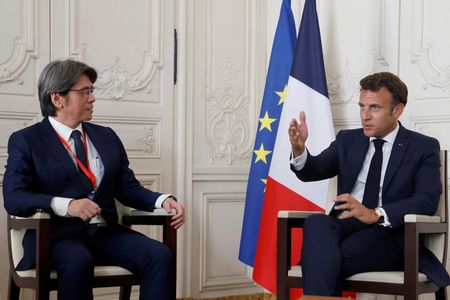 1
1 1
1

By Gilles Guillaume and Elizabeth Pineau
PARIS (Reuters) -France beat competition from Germany and the Netherlands for ProLogium’s first overseas car battery plant thanks to lobbying from President Emmanuel Macron, deal sweeteners and competitive power prices, executives from the Taiwanese company said.
After narrowing a list of countries from 13 to three, ProLogium said it settled on the northern French port city of Dunkirk for its second gigafactory which will make batteries on a large scale.
With production slated to begin in 2026, the gigafactory will be the fourth in northern France, adding to an emerging specialised cluster central to Europe’s electric car industry.
Europe currently largely depends on batteries made in Asia for electric cars, and national leaders are offering various incentives to grow its own industry.
That has become more urgent since the United States last year passed its $430 billion Inflation Reduction Act, which includes major tax subsidies to cut carbon emissions while boosting domestic production and manufacturing.
Macron, who met with ProLogium CEO Vincent Yang at the start of the vetting process, announced the 5.2 billion euro ($5.7 billion) investment on Friday in Dunkirk.
He also announced that Chinese group XTC New Energy Materials planned to invest 1.5 billion euros in a plant in Dunkirk to make materials used in batteries through a joint venture with French firm Orano.
Europe relies heavily on Asia for sourcing and processing raw materials used in batteries like lithium, cobalt and manganese.
“We’ve built an industrial policy to be competitive with China and the United States. The results we’re seeing in Dunkirk and across France aren’t by chance,” Macron said from the shop floor of a local aluminium factory.
Gilles Normand, ProLogium executive vice-president, said that after Macron pitched to Yang more than a year ago Finance Minister Bruno Le Maire helped make the case with the European Commission for EU financial incentives.
“There was then the realisation that there might be some interesting possibilities,” Normand told journalists.
NEED FOR STRATEGIC AUTONOMY
Macron said the EU had come around to French thinking on the need for greater European autonomy after COVID and war in Ukraine exposed supply chain vulnerabilities.
“Without compromising our openness, we are acting to protect our interests, our independence … and to assert our European economic and social model,” Macron wrote in a Financial Times op-ed.
The ProLogium bid also highlighted fierce competition among EU member states for deals.
The timing of the French win over Germany and the Netherlands is fortuitous for Macron, who wants to turn the page on months of strikes and protests over his raising of the retirement age and show sceptical voters his pro-business push is bearing fruit.
ProLogium expects the project to create 3,000 jobs directly and four times as many indirectly, a boon in a region where both far right and far left political parties score highly among voters after years of industrial decline.
The emergence of an industrial cluster around the three battery plants already in the works was in itself an attraction, offering a critical mass of material suppliers and skilled workers, Normand said.
Also playing in France’s favour was its competitively priced zero-carbon electricity, produced by one of the biggest fleets of nuclear plants in the world but also increasingly by offshore wind farms and solar.
Normand added that the government sweetened the deal with an incentives package, but did not give details while further subsidies were under review by the European Commission.
Macron’s government is eager to use the recent relaxation of EU state aid rules to offer new tax breaks and other subsidies to encourage investment in green technologies.
He announced on Thursday that the government would offer a new tax credit worth up to 40% of a company’s capital investment in wind, solar, heat-pump and battery projects.
Meanwhile, the government hopes to boost consumer demand for European-made electric cars by giving a 5,000 euro cash incentive with vehicles meeting demanding low-carbon standards in their production, effectively shutting out non-European cars.
($1 = 0.9084 euros)
(Reporting by Gilles Guillaume, additional reporting and writing by Leigh Thomas; Editing by David Gregorio, Emelia Sithole-Matarise, Elaine Hardcastle)